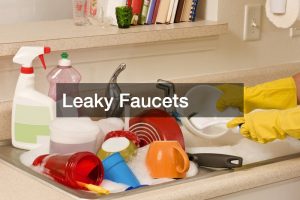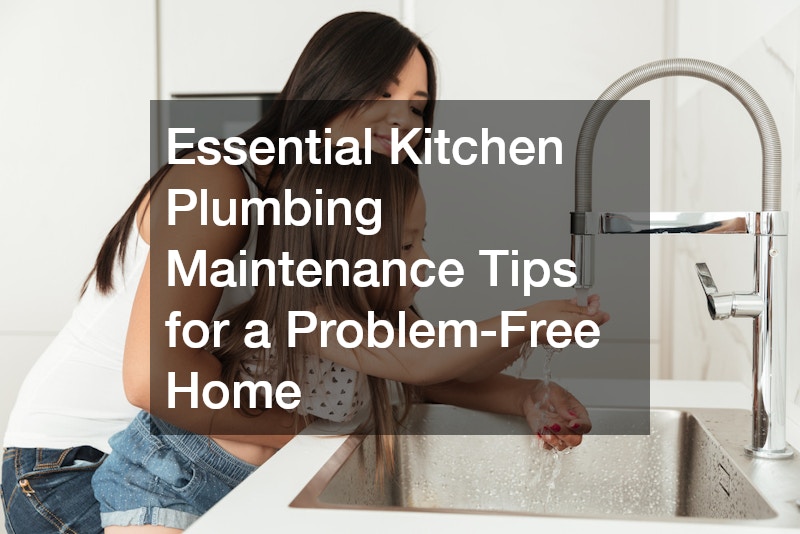Introduction
Maintaining your kitchen plumbing is crucial for a hassle-free home environment. Proper upkeep ensures that your plumbing system operates efficiently, preventing major issues that could disrupt your daily life. Routine kitchen plumbing maintenance can save you from costly repairs and extend the lifespan of your plumbing fixtures. For a comprehensive approach to kitchen upkeep, check out our Kitchen Maintenance Checklist. By following regular maintenance routines, homeowners can enjoy a functional and efficient kitchen space, minimizing unexpected plumbing problems.
Common Kitchen Plumbing Issues
Clogged Drains
Clogged drains are a common issue in many kitchens. They are often caused by food particles, grease, and other debris accumulating in the pipes over time. When left unattended, clogged drains can lead to slow drainage, unpleasant odors, and even potential leaks. It’s essential to address clogs promptly to maintain smooth water flow and avoid damage to your plumbing system. Using a drain strainer can help prevent clogs by catching large particles before they enter the drain.
Regular cleaning of your drains can prevent clogs from becoming a recurring issue. Simple practices, such as pouring boiling water down the drain or using enzymatic cleaners, can help break down buildup. It’s also advisable to avoid disposing of grease or large food scraps down the kitchen sink. Instead, scrape leftovers into the trash or compost bin to minimize the risk of clogs. By being mindful of what goes down your drain, you can significantly reduce the likelihood of encountering clogged pipes.
In cases of severe clogs, it may be necessary to use a plunger or a plumber’s snake. These tools can dislodge blockages and restore proper drainage. If do-it-yourself methods fail, it may be time to call a professional plumber. Persistent clogs can indicate underlying issues that require expert attention. Addressing clogs promptly and effectively is a vital aspect of kitchen plumbing maintenance to ensure a smoothly functioning kitchen.
Leaky Faucets

Leaky faucets are not only annoying but also wasteful. A dripping faucet can lead to significant water wastage over time, increasing your water bills unnecessarily. The constant drip can also damage sink surfaces and fixtures, leading to more extensive repairs. Identifying and fixing leaks early can save water and prevent further damage to your kitchen plumbing. Often, leaks are caused by worn-out washers, corroded valves, or loose connections.
Regularly inspecting your faucets for leaks should be part of your kitchen plumbing maintenance routine. Pay attention to any signs of dripping water, even small ones, as they can escalate quickly. Replacing faulty parts, such as washers or cartridges, can often resolve the issue. In some cases, tightening connections may stop the leak. It’s also beneficial to clean faucet aerators periodically to remove mineral buildup that could contribute to leaks.
Persistent leaks that don’t stop despite your efforts may require professional intervention. A plumber can diagnose and repair the problem more accurately, ensuring a permanent fix. Ignoring leaky faucets not only wastes water but can also strain your plumbing system. By addressing leaks promptly, you can maintain an efficient and cost-effective kitchen environment. Overall, staying vigilant for leaks and conducting timely repairs are crucial steps in effective kitchen plumbing maintenance.
Faulty Garbage Disposals
Garbage disposals are handy kitchen appliances but can experience various problems, such as jams or strange noises. These issues can disrupt kitchen functionality and lead to foul odors or backed-up sinks. Common causes include disposing of hard-to-grind items like bones or fibrous vegetables. Regular kitchen plumbing maintenance helps keep garbage disposals functioning efficiently and minimizes the risk of malfunctions. Running cold water during disposal use and avoiding problematic items can help maintain its performance.
To prevent jams and keep your garbage disposal running smoothly, it’s important to use it correctly. Avoid overloading the disposal and always cut large food items into smaller pieces before grinding. Periodic cleaning can also help maintain the disposal’s efficiency. You can clean the disposal using ice cubes and salt or citrus peels to remove odors and buildup. Additionally, never use hot water during disposal use, as it can soften fats and cause clogs.
If you encounter persistent problems with your garbage disposal, it may be time to seek professional help. A plumber can identify and resolve underlying issues such as motor problems or blockages. Regular maintenance and proper usage can significantly extend the lifespan of your garbage disposal. Ensuring that your garbage disposal functions smoothly is an integral part of maintaining your kitchen plumbing. By taking preventative measures, you can avoid inconvenient breakdowns and keep your kitchen running efficiently.
Routine Maintenance Tips
Inspect and Clean Drains Regularly
A crucial element of kitchen plumbing maintenance is inspecting and cleaning drains regularly. Using a drain strainer can catch debris, preventing it from causing clogs. Cleaning the strainer frequently ensures water flows smoothly down the drain. Additionally, pouring boiling water or a mixture of vinegar and baking soda can help clear minor clogs and keep drains fresh. Regular inspections can help identify potential issues before they escalate into significant problems.
Neglecting drain maintenance can lead to slow drainage and backups, which can disrupt your kitchen routine. Regular cleaning prevents organic matter from accumulating and causing blockages. Using enzymatic cleaners can also break down build-up inside pipes. Being proactive with drain maintenance helps ensure your plumbing system operates efficiently. This simple yet effective practice can save you time and money in the long run.
By making drain inspection and cleaning a regular part of your cleaning routine, you can avoid unexpected plumbing issues. Pay attention to any changes in water flow or unusual odors, as these can indicate developing clogs. Staying on top of drain maintenance not only ensures a smoothly running kitchen but also extends the lifespan of your plumbing system. Overall, regular drain upkeep is an essential aspect of comprehensive kitchen plumbing maintenance.
Check for Leaks
Regularly checking for leaks is vital for maintaining a problem-free kitchen. Inspecting under-sink pipes and faucet connections can help identify leaks before they cause significant damage. Leaks can result from loose fittings, worn seals, or corroded pipes, which can escalate if left unchecked. Addressing leaks promptly can prevent water damage to cabinets, floors, and other kitchen fixtures. This proactive approach is a core aspect of kitchen plumbing maintenance.
Conducting routine inspections can help you catch leaks early and avoid larger issues. Look for signs of moisture or water stains around pipes and fittings. Tightening connections or replacing worn parts can often resolve minor leaks effectively. Regular inspection and maintenance can also help maintain optimal water pressure. Ensuring all connections are secure can prevent water wastage and costly repairs.
Persistent leaks that don’t respond to basic repairs may require professional help. A plumber can diagnose more complex issues and provide a lasting solution. Ignoring leaks can lead to severe water damage and mold growth, posing health risks and requiring extensive repairs. By staying vigilant and addressing leaks early, you can protect your kitchen and ensure efficient plumbing. Regular leak checks are a critical component of thorough kitchen plumbing maintenance.
Maintain the Garbage Disposal
Proper garbage disposal maintenance is essential for a smoothly functioning kitchen. Regularly running cold water while the disposal is in use helps flush out food particles, preventing clogs. Avoiding disposal of hard-to-grind items such as bones, fibrous vegetables, or coffee grounds can also extend its lifespan. Routine maintenance ensures that the disposal operates efficiently and minimizes the risk of breakdowns. A well-maintained disposal enhances kitchen convenience and functionality.
In addition to using cold water, periodically cleaning the disposal can keep it in good working order. Grinding ice cubes or citrus peels can help remove odors and buildup inside the disposal. It’s also important not to overload the disposal and to run it frequently to prevent food residue from accumulating. Ensuring that the disposal blades stay sharp can help maintain their performance. Following these simple practices can prevent common disposal issues.
If the disposal starts making unusual noises or fails to operate, it may be time for maintenance or repairs. A professional can inspect and address any mechanical issues, restoring the disposal’s functionality. Regularly maintaining your garbage disposal contributes to overall kitchen plumbing maintenance, ensuring a reliable kitchen environment. Taking proactive steps to care for your disposal can save you from inconvenient breakdowns and costly repairs.
Test Water Pressure
Testing your kitchen’s water pressure is an important aspect of plumbing maintenance. Proper water pressure ensures that your plumbing system operates efficiently without putting excess strain on pipes. Using a pressure gauge, you can check if the pressure levels are within the recommended range of 40-60 psi. High water pressure can damage pipes and fixtures over time, while low pressure can indicate blockages or other issues. Routine checks help maintain a balanced water pressure, preventing potential plumbing problems.
If you notice low water pressure, it could be due to clogs, leaks, or issues with the main water supply. Inspecting pipes and fixtures can help identify the root cause. Sometimes, cleaning faucet aerators or showerheads can restore normal pressure. Conversely, high water pressure can be managed by installing a pressure-reducing valve. Keeping water pressure within the optimal range protects your plumbing system from undue stress.
Regularly testing and adjusting water pressure is a straightforward yet effective way to ensure optimal kitchen plumbing maintenance. It helps prevent leaks and prolongs the lifespan of your pipes and fixtures. By maintaining appropriate water pressure, you can enjoy consistent water flow and avoid unnecessary repairs. This practice forms an integral part of comprehensive plumbing upkeep, contributing to a well-functioning kitchen environment.
Seasonal Plumbing Checks
Winter Precautions
Winter poses unique challenges for kitchen plumbing, making seasonal checks essential. Insulating exposed pipes helps prevent them from freezing and bursting during cold weather. Pipe insulation sleeves or heat tape can provide protection against freezing temperatures. Additionally, leaving cabinet doors open can allow warm air to circulate around pipes. Draining outdoor faucets and disconnecting hoses can also prevent freezing and potential damage. These precautions are a vital part of kitchen plumbing maintenance during winter.
Frozen pipes can lead to significant water damage and costly repairs. Taking preventive measures can save you from these headaches. If you experience unusually cold weather, running a trickle of water through faucets can prevent freezing. It’s also wise to know the location of your main water shut-off valve in case of emergencies. Preparing your plumbing system for winter ensures that it remains functional through the harshest weather conditions.
Regularly inspecting pipes for signs of freezing, such as frost or unusual coldness, can help you address issues before they escalate. If a pipe does freeze, applying heat slowly with a hairdryer or heating pad can help thaw it safely. Taking these proactive steps ensures your plumbing system remains reliable during winter months. Seasonal checks and preparations are key components of comprehensive kitchen plumbing maintenance.
Summer Considerations
Summer brings different challenges for kitchen plumbing, making seasonal checks equally important. Increased water usage can strain your plumbing system, leading to leaks or other issues. Checking for any existing damage or wear can prevent problems from worsening. Inspect outdoor faucets and irrigation systems to ensure they are functioning correctly. Addressing minor issues early can prevent major disruptions during the summer.
The warmer weather also means an increased likelihood of clogs from food debris as social gatherings and cooking become more frequent. Regularly clean drains and maintain your garbage disposal to avoid these problems. Additionally, monitoring water pressure can help identify potential issues caused by higher water demand. Taking these steps ensures your kitchen plumbing can handle the increased activity during the summer months.
Routine checks and maintenance can help keep your plumbing system in top shape year-round. By being proactive, you can prevent unexpected breakdowns and enjoy a smoothly functioning kitchen. Summer is also a good time to revisit any postponed maintenance tasks, ensuring your plumbing is ready for all seasons. Seasonal plumbing checks are an essential part of maintaining a problem-free kitchen environment.
When to Call a Professional
Signs You Need Expert Help
While some plumbing maintenance tasks can be handled by homeowners, certain issues require professional expertise. Persistent leaks, unexplained low water pressure, or unusual noises are signs that expert help may be needed. These issues can indicate underlying problems that, if neglected, could cause significant damage. A professional plumber can provide a thorough diagnosis and implement appropriate solutions. Identifying when to seek professional assistance is crucial for effective kitchen plumbing maintenance.
Attempting to fix complex plumbing problems without proper knowledge can lead to further damage. Professionals have the necessary skills and tools to handle intricate repairs safely and efficiently. They can also offer preventive advice to avoid future issues. Knowing when to call a professional can save you from costly repairs and ensure the longevity of your plumbing system. It’s better to address potential problems early rather than facing emergencies later.
When choosing a plumber, look for licensed professionals with good reviews and reasonable rates. A reliable plumber can become a valuable resource for regular maintenance and emergency repairs. Building a relationship with a trusted plumber ensures you have expert help when you need it. Overall, recognizing when professional intervention is required is a key aspect of comprehensive kitchen plumbing maintenance.
Choosing a Reliable Plumber
Finding a reliable plumber is essential for maintaining a problem-free kitchen. Start by seeking recommendations from friends, family, or online reviews. Look for plumbers who are licensed and insured to ensure they meet industry standards. Checking their experience and expertise with kitchen plumbing issues can also provide peace of mind. Choosing a reputable plumber ensures you receive quality service and effective solutions.
When interviewing potential plumbers, ask about their rates, availability, and warranty on work performed. Clear communication and transparent pricing can help prevent misunderstandings. It’s also beneficial to inquire about their response time for emergency services. A reliable plumber should be able to provide references or testimonials from satisfied customers. Evaluating these factors helps you make an informed decision.
Building a relationship with a reliable plumber can be advantageous for ongoing maintenance and repair needs. They can provide valuable advice on preventive measures and identify potential issues early. Regular check-ups from a trusted professional can enhance your kitchen plumbing maintenance routine. Overall, investing time in finding the right plumber ensures your kitchen remains in optimal condition, free from unexpected plumbing problems.
Conclusion
In conclusion, regular kitchen plumbing maintenance is crucial for a problem-free home. By following the tips provided, homeowners can address common issues and prevent major disruptions. Referring to the Kitchen Maintenance Checklist offers a more comprehensive guide to keeping your kitchen in top shape. A small investment in routine maintenance can save homeowners up to 10% on their water bills annually. By taking proactive steps, you can enjoy a functional and efficient kitchen space.
Actionable Tips and Statistics
Mention that a small investment in routine maintenance can save homeowners up to 10% on their water bills annually. Regular inspections and timely repairs contribute significantly to overall household savings. Emphasizing the importance of ongoing maintenance can inspire homeowners to take proactive steps. These practical tips help illustrate the long-term benefits of consistent kitchen plumbing upkeep. By addressing potential issues early, you can avoid costly repairs and ensure your plumbing system functions efficiently.
Include a statistic about the average cost of plumbing repairs to highlight the value of preventive maintenance. For instance, mentioning that average plumbing repairs can cost hundreds to thousands of dollars can emphasize the cost-effectiveness of regular maintenance. Understanding these financial implications can motivate homeowners to prioritize plumbing upkeep. Preventive measures, such as regular inspections and minor repairs, can help avoid significant expenses. Demonstrating the tangible benefits of proper maintenance reinforces its importance.
Providing actionable tips and relevant statistics ensures readers understand the value of maintaining their kitchen plumbing. By highlighting potential savings and cost avoidance, the importance of routine maintenance becomes clear. Encouraging readers to adopt these practices can lead to more efficient and reliable plumbing systems. Overall, incorporating these tips and statistics helps underline the significance of comprehensive kitchen plumbing maintenance. Taking a proactive approach ensures a functional and problem-free home environment.


